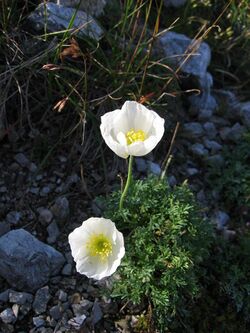Biology:Oreomecon
| Oreomecon | |
|---|---|

| |
| Oreomecon alpina, syn. Papaver alpinum | |
| Scientific classification | |
| Kingdom: | Plantae |
| Clade: | Tracheophytes |
| Clade: | Angiosperms |
| Clade: | Eudicots |
| Order: | Ranunculales |
| Family: | Papaveraceae |
| Subfamily: | Papaveroideae |
| Tribe: | Papavereae |
| Genus: | Oreomecon Banfi, Bartolucci, J.-M.Tison & Galasso[1] |
| Synonyms[2] | |
| |
Oreomecon is a genus in the poppy family Papaveraceae.[1] It was established in 2022 for what was previously treated as Papaver sect. Meconella in order to ensure that the genus Papaver was monophyletic.[2] (As of June 2023), names in the genus Oreomecon had only been published for better known and phylogenetically understood species present in Europe, either as natives or aliens.[2][3]
Taxonomy
Molecular phylogenetic studies of the genus Papaver from 1997 onwards showed that as then circumscribed, the genus was not monophyletic. Three clades could be distinguished within the original circumscription of Papaver: Papaver sensu stricto, Papaver sect. Meconella, and a combination of Papaver sect. Argemonidium and Roemeria. Meconopsis (excluding Meconopsis cambrica) made up a fourth clade, embedded within the original circumscription of Papaver.[2] A 2006 study suggest the four clades were related as shown in the following cladogram:[4]
| |||||||||||||||||||
Subsequently, Meconopsis cambrica and Stylomecon were transferred to Papaver,[5][6] and Roemeria expanded to include Papaver sect. Argemonidium. In 2022, the genus Oreomecon was established and some better known and understood species present in Europe, either natives or alien, were transferred to that genus.[2][3]
Papaver sect. Meconella could not be raised to the rank of genus under the name Meconella because Meconella Nutt. was already used for a group of American species of poppies, hence a new name was required. Oreomecon is derived from grc ὄρος (oros) 'mountain', and μήκων (mēcōn) 'poppy',[2] hence 'mountain poppy'.
Species
Sources differ in number of species placed in Papaver sect. Meconella (and thus open to transfer to Oreomecon). In 2006, a range of 24 to 30 species was suggested.[2] The Papaver alpinum group has been treated particularly variably, with one to seven or more species accepted, along with numerous subspecies. A 2009 study concluded that "most previous taxonomic concepts of P. alpinum s.l. were highly artificial" and recognized only one species, with possibly two subspecies.[7]
(As of June 2023), Plants of the World Online (PoWO) listed in Oreomecon only the six species transferred in 2022:[1]
- Papaver alpinum L. → Oreomecon alpina (L.) Banfi, Bartolucci, J.-M.Tison & Galasso
- Papaver anomalum Fedde → Oreomecon anomala (Fedde) Banfi, Bartolucci, J.-M.Tison & Galasso
- Papaver croceum Ledeb. → Oreomecon crocea (Ledeb.) Banfi, Bartolucci, J.-M.Tison & Galasso
- Papaver miyabeanum Tatew. → Oreomecon miyabeana (Tatew.) Banfi, Bartolucci, J.-M.Tison & Galasso
- Papaver nudicaule L. → Oreomecon nudicaulis (L.) Banfi, Bartolucci, J.-M.Tison & Galasso
- Papaver radicatum Rottb. → Oreomecon radicata (Rottb.) Banfi, Bartolucci, J.-M.Tison & Galasso
(As of June 2023), the Germplasm Resources Information Network (GRIN) listed 11 species in Papaver sect. Meconella, of which the following are additional to those listed above:[8]
- Papaver alboroseum Hultén
- Papaver aurantiacum Loisel. – included in Oreomecon alpina by PoWO[9]
- Papaver dahlianum Nordh.
- Papaver lapeyrouseanum Gutermann ex Greuter & Burdet – included in Oreomecon alpina by PoWO[10]
- Papaver lapponicum (Tolm.) Nordh.
- Papaver macounii Greene
- Papaver pseudocanescens Popov
- Papaver rubroaurantiacum (Fisch. ex DC.) Fisch. ex Steud.
References
- ↑ 1.0 1.1 1.2 "Oreomecon Banfi, Bartolucci, J.-M.Tison & Galasso" (in en). Royal Botanic Gardens, Kew. http://www.plantsoftheworldonline.org/taxon/77307938-1.
- ↑ 2.0 2.1 2.2 2.3 2.4 2.5 2.6 Banfi, Enrico; Bartolucci, Fabrizio; Tison, Jean-Marc; Galasso, Gabriele (2022), "A new genus for Papaver sect. Meconella and new combinations in Roemeria (Papaveraceae) in Europe and the Mediterranean area", Natural History Sciences 9 (1): 67–72, doi:10.4081/nhs.2022.556
- ↑ 3.0 3.1 Papaveraceae - Tribe Papaverae, https://wfo-about.rbge.info/tens/papaveraceae_tribe_papaverae, retrieved 2023-06-05
- ↑ Carolan, James C.; Hook, Ingrid L.I.; Chase, Mark W.; Kadereit, Joachim W.; Hodkinson, Trevor R. (2006), "Phylogenetics of Papaver and Related Genera Based on DNA Sequences from ITS Nuclear Ribosomal DNA and Plastid trnL Intron and trnL–F Intergenic Spacers", Annals of Botany 98 (1): 141–155, doi:10.1093/aob/mcl079, PMID 16675606
- ↑ "Meconopsis cambrica (L.) Vig." (in en). Royal Botanic Gardens, Kew. http://www.plantsoftheworldonline.org/taxon/673281-1.
- ↑ "Stylomecon G.Taylor" (in en). Royal Botanic Gardens, Kew. http://www.plantsoftheworldonline.org/taxon/297607-2.
- ↑ Schönswetter, Peter; Solstad, Heidi; Escobar García, Pedro; Elven, Reidar (2009), "A combined Molecular and Morphological Approach to the Taxonomically Intricate European Mountain Plant Papaver alpinum s.l. (Papaveraceae) — Taxa or Informal Phylogeographical Groups?", Taxon 58 (4): 1326–1343, doi:10.1002/tax.584020
- ↑ Species of Papaver L. sect. Meconella, Agricultural Research Service (ARS), United States Department of Agriculture (USDA), https://npgsweb.ars-grin.gov/gringlobal/taxon/taxonomyspecieslist?id=19131&type=section, retrieved 2023-06-06
- ↑ "Papaver aurantiacum Loisel." (in en). Royal Botanic Gardens, Kew. http://www.plantsoftheworldonline.org/taxon/673416-1.
- ↑ "Papaver lapeyrouseanum Gutermann ex Greuter & Burdet" (in en). Royal Botanic Gardens, Kew. http://www.plantsoftheworldonline.org/taxon/898351-1.
Wikidata ☰ {{{from}}} entry
 |

